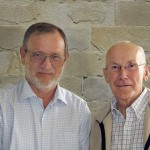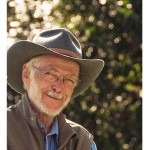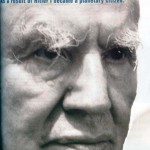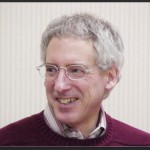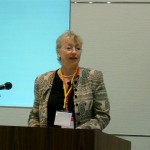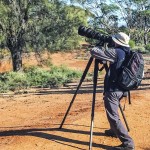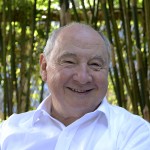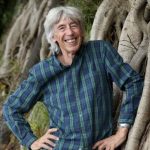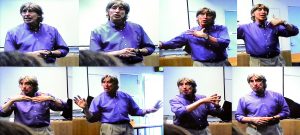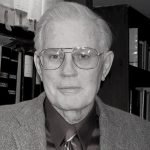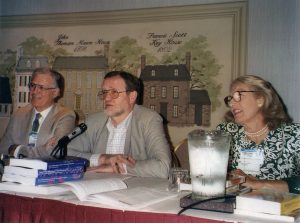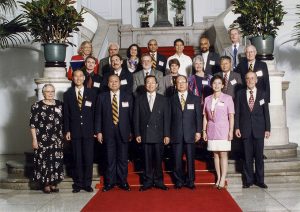Frank Hampson: Artist, Dan Dare Creator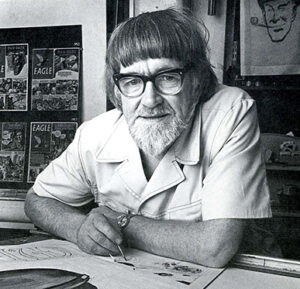
The one person who influenced me in early years more than any other, and sowed the seeds of my later career in futures, was Frank Hampson, creator of Dan Dare. Apart from a cast of fully rendered and compelling characters, he also created full colour depictions of fascinating worlds both here on Earth and beyond. I was delighted to meet him in person just once at an SF con in Brighton not long before he died, and to say ‘thank you.’ This is my tribute to him written many years later. Read more…
Hedley Beare
Hedley Beare: A Personal Appreciation (2010.) I first met Hedley Beare when I came to Melbourne to address the Futures in Education conference during November 1986. Like many others I was immediately struck by his geniality and openness, his quiet manner and generosity of spirit. He was someone you immediately trusted and knew you could rely on. So it was with enormous pleasure that in 1989 I joined his Department at the University of Melbourne as a ‘lecturer in futures and social education.’ Read more…
Hedley and I in 2006
Education Futures: Painting a New Picture, Interview with Hedley Beare, 21C, Commission for the Future, 1992, (1992) Read on…
Frank Fisher
Frank and I met at the RMIT centenary conference in Melbourne in the 1980s. He was one of the first to welcome me to Australia and to help me get established. For example he arranged a Visiting Fellowship for me at Monash University in 1988. I taught a short course on Recovering the Future. A book of readings was produced for the course. While long out of print it was included on the CD-ROM Towards A Wise Culture that can be ordered from the Foresight International site. Here is an obituary from The Age newspaper followed by an appreciation of my own. Frank Fisher obituary can be found here. My personal appreciation of Frank is here.
An eBook about Frank’s work and the wide influence he had on so many people can be found here: Everyday Transcendence: The Influence of Frank Fisher.
VA video of an evening with Frank Fisher in 2012 can be accessed here (Frank begins 14 mins in): http://vimeo.com/album/2065942/video/45620120
Robert Jungk was one of the pioneering European futurists. He was one of the ‘fathers’ of the World Futures Studies Federation and his books were widely read. The obituary I wrote for him in 1994 can be found here.
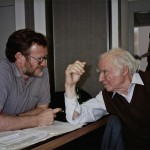 One Man Revolution. An interview article with Bob from 21C, Commission for the Future, Melbourne 1992 can be found here.
One Man Revolution. An interview article with Bob from 21C, Commission for the Future, Melbourne 1992 can be found here.
Robert Jungk and I at a seminar in his home town of Salzburg in 1990.
David Berry
David and Patti in Ringwood, Hampshire, UK, 2010
I first met David Berry through the World Future Society (WFS). Although it was an American organisation there had been a London-based group associated with it and David was part of that group. He started heading over the Atlantic for WFS meetings some years earlier than I did. So when we first met in the late 1970s he was already on speaking terms with some of the leading futurists of the time. Read more…
Allen Tough was a ‘second generation’ pioneer of the futures field and, apart from his family, will be remembered most fondly by his students and those who, like myself, had the pleasure of working with him. I first met Allen at a series of World Futures Studies Federation (WFSF) meetings in the late 1980s. Even then he played a prominent role. Read more.. Wikipedia: Allen Tough’s Wikipedia Entry is here
Jan Lee Martin
I first met Jan in Sydney over 20 years ago. Back then she was described as a corporate communications specialist. As time passed we seemed to meet up more often. Then, after she set up the Futures Foundation in 1995, we began to meet more regularly both in Sydney and elsewhere. She was determined to make a difference and spared no effort to engage people and organisations in thinking and acting more consciously about and for the future. Read more… Anita Sykes-Kelleher has written a more in-depth appreciation of Jan which you can find here.
Tom Oliver and I were drawn together by a common interest – a passion for birds and bird photography. Until I met Tom I was pretty much a confirmed ‘loner.’ That is, my idea of ‘heaven’ was to be outdoors in the sun with birds and my Nikon. I was, and still am, uninterested in competitions but very interested in learning more about this multi-dimensioned craft. As one still actively involved in a full-on academic and writing life I simply did not have time to search out the relevant websites and people. So I pretty much carried on as usual – without realising just how much I was missing. But Tom provided the catalyst for a whole new way of thinking and operating. Read more …
Adolph was born in the Yugoslavian village of Krndija in November 1941. His family belonged to the Danube Swabians, who were descended from 18th-century immigrants. These had been recruited to re-colonise the area after the end of the Ottoman Empire. During World War Two, however, ethnic genocide was employed in part to clear the area for collectivisation under Tito. Adolph was named thus as a symbolic gesture of protection. Nevertheless, in October 1944, as the Russian army approached, he and his family fled the conflagration on horse-drawn wagons. Read more…
Richard Neville
Like many others I was aware of Richard Neville’s role in the 1960s and 70s counterculture. Although living overseas at the time I knew about the 1971 obscenity trial in London and was pleased to hear of the subsequent acquittal. While I’d not participated in the drugs scene or had any real interest in Leary’s mantra (‘tune in, turn on and drop out’) I liked the way that Richard and his collaborators were willing to challenge what I then saw as the stifling conventionalism of British post-war existence. Read More…
Guardian obituary: https://www.theguardian.com/media/2016/sep/04/richard-neville-obituary
Richard speaking at an AusForesight event, Swinburne, 2006
Wendell Bell: A Personal Appreciation
I first met Wendell Bell in Toronto in 1980 at what was then described as the First Global Conference on the Future. He and I were both presenting at a session on Futures in Education. The contrasts between us could not be greater – I merely a young grad student at the time and he a successful Professor of Sociology at Yale. But he treated me like an old friend and made me feel welcome in what was certainly an unusual environment. As time passed, it became clear that Wendell was indeed one of the giants of our field. Naturally enough, I followed his work and, for some reason, he followed mine as well as that of many other younger colleagues and friends. Read more…
Listen to this October 2020 conversation between Richard Slaughter and Tom Lombardo on their colleague and friend Wendell Bell’s life and work. Available here on Peter Hayward’s FuturePod series: https://www.futurepod.org/podcast/2020/10/24/ep-74-the-futures-community-remembers-wendell-bell
Hazel Henderson: Pioneer Futurist and Social Innovator
I first came across Hazel and her work in the mid-1980s through a series of articles in an British ‘alternatives’ magazine called Undercurrents. At the time I was just beginning my long journey into Futures enquiry. I knew next to nothing about the domain she so ably represented but found her articles helpful and inspiring. Somehow, in each case, she was able to offer a sturdy critique about almost anything without becoming aggressive or lowering the tone in any way. Fundamentally, she was a social innovator par excellence. For her, describing a problem or issue was merely first step. Beyond this lay a host of options that she believed people were exquisitely equipped to explore and develop.
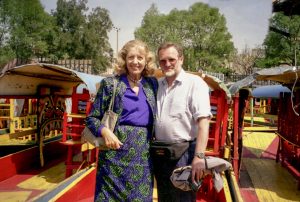
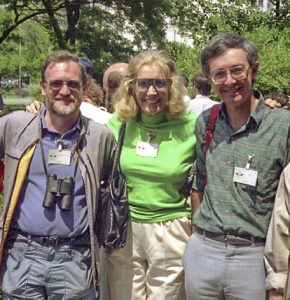 She owed much, as so many of us do, to E.F. Schumacher, well-known everywhere for works like Small is Beautiful. In fact, her first book Creating Alternative Futures contains a very brief but deeply appreciative Foreword by him written only a few months before his death in 1977. Years later, in 1993, I was similarly honoured when she agreed to do the same for my own book, The Foresight Principle. By then we had been meeting up for some time at various conferences and meetings around the world. I still vividly recall the occasion in Toronto, 1980, when she took on Herman Kahn in a two-person debate and gave no ground whatsoever to his over-confident, technocratic and narrowly US-oriented views. Hazel was already thinking and speaking like the global citizen she was. She appeared strong and spoke directly but there was always a warmth in the way she carried herself. She could be demanding at times, but was also considerate, always thinking with, and working for, others especially the less-well-off. She wanted to ‘open up the social imagination and help remind people that we humans are incredibly inventive.’
She owed much, as so many of us do, to E.F. Schumacher, well-known everywhere for works like Small is Beautiful. In fact, her first book Creating Alternative Futures contains a very brief but deeply appreciative Foreword by him written only a few months before his death in 1977. Years later, in 1993, I was similarly honoured when she agreed to do the same for my own book, The Foresight Principle. By then we had been meeting up for some time at various conferences and meetings around the world. I still vividly recall the occasion in Toronto, 1980, when she took on Herman Kahn in a two-person debate and gave no ground whatsoever to his over-confident, technocratic and narrowly US-oriented views. Hazel was already thinking and speaking like the global citizen she was. She appeared strong and spoke directly but there was always a warmth in the way she carried herself. She could be demanding at times, but was also considerate, always thinking with, and working for, others especially the less-well-off. She wanted to ‘open up the social imagination and help remind people that we humans are incredibly inventive.’
It’s not surprising that she became a powerful influence on my own thinking and work. She stands along with other ‘greats’ such as Bob Jungk, Wendell Bell and Joanna Macy as one of those people who simply make the world a better place. In 1992 I interviewed her via long-distance phone call for 21C (Issue 7, Spring, 70-75) the glossy colour magazine of the Australian Commission for the Future. Since the original text is incomplete, I’ve included here the edited transcript of a similar interview recorded a few years later. Here she reflects on her early experiences with people such as Ralph Nader and her years spent in the Office of Technology assessment (abolished by Reagan). Other themes include her long-standing attempts to bring a measure of sanity and balance to economics and her early concerns regarding the IT revolution, then gathering pace. I particularly appreciated some of her sometimes pointed, but accurate, comments. For example, her view that ‘technological innovations, because they took place within the free market system, were praised however dumb they were.’
Perhaps the overall highlight was when the first hard copy slip case edition of the Knowledge Base of Futures Studies was launched at a 1996 WFS conference in Washington D.C. The second to last picture above says it all. With Wendell Bell on one side, Hazel on the other, who could wish for more high-quality support, understanding and encouragement? I’m honoured to have known and worked with such people…
Key to images from top left: Mexico City Canals 1994; Budapest 1990, with Ian Lowe; Washington DC 1996, with Wendell Bell; WFSF group with then Taiwan President, also Clement & Carrie Chang (Tamkang University), Walter Kistler et al, 2000.

